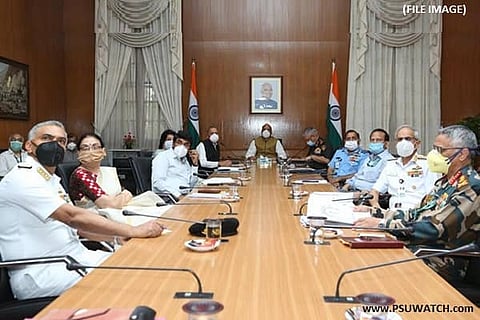
- News Updates
- PSU Watch
- Defence News
- Policy Watch
- हिन्दी न्यूज़
- Jobs Watch
- States News
- Event News

New Delhi: It was on April 20, around a month from today when the Defence Minister Rajnath Singh called upon a high-level review of the recommendations of the Shekatkar Committee on reforming the armed forces. Lieutenant-General (retd) DB Shekatkar Committee was set up during the tenure of former Defence Minister Manohar Parrikar in 2016. The committee had given its report in December 2016. The government on Monday accepted the committee's recommendations related to creating border infrastructure. "Government has accepted and implemented three important recommendations of the Committee of Experts (CoE) under the Chairmanship of Lt General DB Shekatkar (Retd) relating to border Infrastructure. These were related to speeding up road construction, leading to socio-economic development in the border areas", mentioned a press release sent by Ministry of Defence.
On the matter related to creating border infrastructure, the Government has implemented the recommendation of CoE to outsource road construction work beyond optimal capacity of Border Roads Organisation (BRO). It has been made mandatory to adopt Engineering Procurement Contract (EPC) mode for execution of all works costing more than Rs 100 crore.
The other recommendation relating to the introduction of modern construction plants, equipment and machinery has been implemented by delegating enhanced procurement powers from Rs 7.5 crore to Rs 100 crore to BRO, for domestic and foreign procurements. Border Roads has recently inducted Hot-Mix Plant 20/30 TPH for the speedier laying of roads, remotely operated hydraulic Rock Drills DC-400 R for hard rock cutting, a range of F-90 series of self-propelled snow-cutters/blowers for speedier snow clearance.
New Technology like blasting technology for precision blasting, use of Geo-Textiles for soil stabilisation, the cementitious base for pavements, plastic-coated aggregates for surfacing, is also being used to enhance the pace of construction. With the empowerment of field officers through enhanced delegation of financial and administrative powers, there has been significant improvement in faster financial closure of works.
The land acquisition and all statutory clearances like forest and environmental clearance are also made part of the approval of the Detailed Project Report (DPR). Further, with the adoption of EPC mode of execution, it is mandatory to award work only when 90 per cent of the statutory clearances have been obtained, implementing the recommendation of CoE regarding obtaining prior clearances before the commencement of the project.
The Shekatkar committee was set up largely to suggest ways and means to enhance the combat potential of the armed forces and re-balancing defence expenditure, though its report has never been made public, because it covers operational aspects of the armed forces, and its disclosure is not in the interests of national security.
